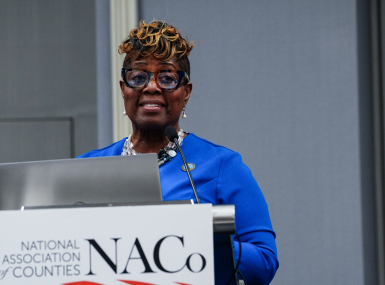NACo submits comments on proposed rules regarding new foster care requirements and strengthening TANF
Author

Julia Cortina
Upcoming Events
Related News

Key Takeaways
UPDATE (1/13/2025): On Monday, January 13, the Administration for Children and Families (ACF) announced the withdrawal of the Strengthening the Temporary Assistance for Needy Families (TANF) as a Safety Net and Work Program proposed rule.
On November 27 and December 1, the National Association of Counties (NACo) submitted comments on two Notices of Proposed Rulemaking (NPRMs) from the U.S. Department of Health and Human Services Administration for Children and Families (ACF) that would impact county administration of federal child welfare and anti-poverty programs.
County Recommendations on Ensuring Safe Placements for LGBTQI+ Foster Youth
County governments are fully or partially responsible for overseeing the child welfare system in 11 states and are committed to providing the most safe and appropriate placements for all children in our care.
In response to an NPRM outlining new requirements for child welfare agencies related to placements for LGBTQI+ foster youth, NACo’s comments urged ACF to:
Ensure placements are safe and appropriate for all marginalized and at-risk populations, such as children of color, children with disabilities, and well as infants and toddlers
Address the broader youth placement crisis and ongoing human services workforce shortages in order to effectively implement the NPRM
Issue clearer guidance to mitigate potential impacts on out-of-state, non-relative, and/or congregate placements
Clarify potential conflicts with state law on gender-affirming care for minors
County Recommendations on Strengthening the Temporary Assistance for Needy Families (TANF) as a Safety Net and Work Program
County governments are responsible for administering the TANF Program in 9 states.
In response to an NPRM on strengthening and removing administrative burdens of the TANF Program, NACo’s comments urged ACF to:
Consider greater flexibility in setting the income eligibility threshold to recognize the diverse economic realities faced by families in different counties
Clarify and provide additional guidance on the application of the proposed “reasonable person” standard and allow counties to take corrective action before imposing financial penalties
Issue clearer guidance on the allowability of costs associated with disseminating program information
Address structural problems regarding TANF work requirements and work with Congress on a substantive bipartisan reauthorization to enhance the program's effectiveness
Additional Resources
NACo Comment Letter: TANF NPRM
NACo Comment Letter: Safe and Appropriate Foster Care Placement
NACo Policy Brief: TANF Program
Safe and Appropriate Foster Care Placement Requirements NPRM

National Association of Counties Launches Initiative to Strengthen County Human Services Systems
The National Association of Counties (NACo) announces the launch of the Transforming Human Services Initiative, a new effort to help counties modernize benefits administration, integrate service delivery systems and strengthen county capacity to fulfill our responsibility as America’s safety net for children and families.

Congress seeking ‘common-sense solutions’ to unmet mental health needs
Rep. Andrea Salinas (D-Ore.): “Right now, it is too difficult to access providers … and get mental health care in a facility that is the right size and also the appropriate acuity level to meet patients’ needs.”

Prince William County transforms crisis care through "No Wrong Door" approach
Prince William County, Va.’s Crisis Receiving Center is bridging the gap between emergency room care and traditional outpatient care in behavioral crisis response and reducing burden on local law enforcement and hospitals.
